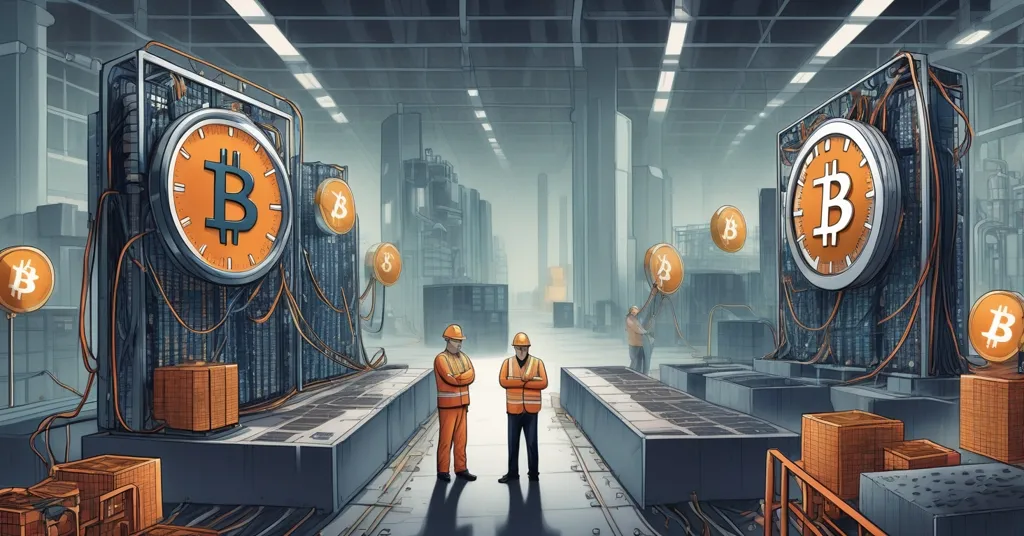South Korea’s Tariff Battle with U.S. Threatens Tech and Bitcoin Mining Supply Chains

South Korea’s Trade Deadline Push with the U.S.: Tariffs Threaten Tech and Crypto Supply Chains
South Korea is in a high-stakes battle to extend trade negotiations with the United States beyond the looming July 9, 2025, deadline, as a potential tariff surge from 10% to 25% threatens to hammer its export-driven economy. As a key ally and tech manufacturing powerhouse, Seoul’s struggle isn’t just about cars and steel—it could ripple into the cryptocurrency and blockchain sectors, where South Korean hardware plays a critical role.
- Deadline Crunch: South Korea seeks more time past July 9 to dodge a tariff hike from 10% to 25% on U.S. shipments.
- Economic Blow: GDP growth forecast for 2025 slashed from 1.5% to 0.8% due to existing U.S. levies.
- Crypto Connection: Tariff disruptions could spike costs for semiconductor-dependent Bitcoin mining rigs.
Tariff Tensions: South Korea’s Economic Tightrope
As a linchpin in global supply chains, South Korea produces everything from semiconductors that power our smartphones and crypto mining rigs to automobiles that dominate U.S. highways. Despite this deep alliance with the U.S.—think military partnerships and shared tech innovation—Seoul finds itself squarely in the crosshairs of President Donald Trump’s protectionist tariff crusade. The current 10% tariff on South Korean goods shipped to the U.S. is already a gut punch, but a looming escalation to 25% (including a 15% reciprocal tariff, which is essentially a tit-for-tat tax to balance trade, plus extra sectoral duties on steel and autos) could be catastrophic. The South Korean central bank isn’t mincing words: it’s cut its 2025 GDP growth forecast from 1.5% to a dismal 0.8%. For the average person, that’s not just a number—it signals potential job cuts, higher prices on goods, and less cash for tech innovation, including the blockchain projects many of our readers care about. For more on the broader economic impacts, check out this discussion on U.S. tariffs affecting South Korea’s economy.
At the forefront of this fight is South Korea’s new Trade Minister, Yeo Han-koo, who’s been burning the midnight oil in Washington, meeting with heavyweights like U.S. Trade Representative Jamieson Greer and Commerce Secretary Howard Lutnick. His pitch? South Korea isn’t just a trading partner; it’s a vital cog in the U.S.’s so-called “manufacturing renaissance.” But the Trump administration’s response is a mixed bag, and the clock is ticking. With a $66 billion goods trade deficit with the U.S. in 2024 hanging over Seoul’s head, the pressure to concede—or at least buy time—is immense. A senior South Korean trade official didn’t sugarcoat it, admitting that expecting a finalized deal by July 9 is flat-out unrealistic. Hence, the desperate push for an extension. Get deeper insights into Yeo Han-koo’s ongoing negotiations with U.S. officials.
Trump’s Hardball vs. Flickers of Flexibility
President Trump isn’t exactly rolling out the welcome mat for deadline extensions. His stance is as blunt as a sledgehammer, and he seems almost giddy at the prospect of slapping higher tariffs on everyone, allies included. For the latest on his position, see this update on Trump’s tariff policy and deadline statements.
“I don’t think I’ll need to [extend the deadline], I could, no big deal.”
Trump said on Fox News, before amping up the rhetoric with a line that likely made trade negotiators choke on their coffee:
“I’d like to make it shorter. I’d like to just send letters out to everybody, ‘Congratulations, you’re paying 25%.’”
That’s the kind of talk that keeps Seoul up at night. But not every U.S. voice is singing the same tune. Treasury Secretary Scott Bessent has dangled a carrot, suggesting there’s room to wrap up trade deals with key partners by Labor Day 2025 if the terms are right.
“If we can ink 10 or 12 of the important 18—there are another important 20 relationships—then I think we could have trade wrapped up by Labor Day.”
Commerce Secretary Lutnick has echoed this, hinting at willingness to negotiate sectoral tariffs—specific taxes on industries like steel or autos—if South Korea brings serious commitments to the table. What “serious” means is anyone’s guess, and with domestic economic woes piling up, Seoul’s ability to offer big concessions is questionable at best. South Korea’s new President, Lee Jae-Myung, is caught between a rock and a hard place: give too much to the U.S., and face backlash at home; give too little, and risk economic ruin via tariffs. Learn more about the ongoing South Korean push to extend trade talks with the U.S.
Beyond Tariffs: A Clash of Economic Visions
Let’s pull back the curtain on the bigger picture. This isn’t just about slapping taxes on goods; it’s a fundamental clash of economic philosophies. Trump’s obsession with shrinking trade deficits and boosting U.S. manufacturing means even close allies like South Korea—historically shielded by the U.S.-Korea Free Trade Agreement (KORUS FTA), which kept tariffs on U.S. imports near zero—are now fair game. For a detailed background on this agreement, refer to this comprehensive overview of U.S.-South Korea trade relations. The U.S. is also poking at non-tariff barriers, like South Korea’s tight regulations on online platforms and high-precision data exports, plus agricultural headaches such as a ban on American beef from cattle over 30 months old. As Suh Jin-kyo of GS&J Institute warned, even touching the beef issue could ignite a political firestorm in South Korea, potentially backfiring on U.S. beef already in the market.
But let’s play devil’s advocate for a moment. From the U.S. perspective, tariffs are a tool to level the playing field and bring jobs home—an argument that resonates with Trump’s base. Chang Sung-gil, a senior official at South Korea’s Industry Ministry, counters that the U.S. already gets preferential access to South Korea’s agricultural and service sectors despite the goods deficit. It’s a fair point, but when you’re staring down a 25% tariff gun, fair points don’t always win the day. The reality is, these negotiations aren’t just about numbers; they’re tangled up in domestic politics, defense cost-sharing for the 28,500 U.S. troops in South Korea, and even foreign exchange rates being hashed out in separate talks. It’s a messy web, and Seoul’s betting on its strategic value to untangle it.
Crypto Collision: How Tariffs Could Hit Bitcoin Miners
Now, let’s zero in on why this matters to our community of Bitcoin enthusiasts and blockchain innovators. South Korea isn’t just a car and steel exporter; it’s a semiconductor juggernaut, with companies like Samsung and SK Hynix producing the chips that power everything from laptops to the specialized ASIC (Application-Specific Integrated Circuit) machines that mine Bitcoin. These rigs are the beating heart of the Bitcoin network, crunching complex math problems to validate transactions and secure the blockchain. If tariffs jack up the cost of South Korean semiconductors or snarl supply chains, the price of mining hardware could skyrocket. For miners—whether you’re a small-time hobbyist or a massive operation—that means thinner margins or outright inability to scale. We’re talking potential delays in getting new rigs online, directly impacting Bitcoin’s hash rate and network security if global mining capacity takes a hit. Explore this analysis of South Korea’s semiconductor role in Bitcoin mining for a deeper dive.
Looking at historical patterns, South Korea’s tech-savvy population has turned to cryptocurrency during past economic squeezes as a hedge against traditional market chaos. Remember the 2017-2018 crypto boom, when South Koreans drove Bitcoin prices to a “Kimchi Premium” far above global averages? Economic pain from tariffs could ignite similar interest, pushing more individuals and businesses toward decentralized finance (DeFi) and Bitcoin as alternatives to a faltering centralized economy. On the flip side, though, let’s not get carried away with optimism. If tariffs cripple tech exports and slow innovation, South Korea’s blockchain startups—already a vibrant scene—might struggle to fund new projects or compete globally. It’s a double-edged sword, and the outcome hinges on how brutally these trade barriers hit. Community discussions on platforms like Reddit highlight tariffs’ potential impact on tech and crypto.
Global Stakes: A Microcosm of Trade Chaos
South Korea’s tariff showdown is a snapshot of broader global trade tensions in 2025. Trump’s push to lock down deals with major partners by Labor Day signals that Seoul isn’t the only one sweating under this pressure. Other nations are likely navigating similar ultimatums, and the fallout could reshape supply chains for years. For our tech-focused lens, this isn’t just geopolitics—it’s a warning shot. If key manufacturing hubs like South Korea get squeezed, the downstream effects on hardware costs and availability could slow the decentralized revolution we’re all rooting for. And yet, there’s a silver lining: when centralized systems falter, decentralized alternatives often gain traction. Could this economic crunch be Bitcoin’s moment to shine in South Korea, much like it has during crises elsewhere? For a broader perspective on the industries at stake, see this report on tariffs impacting semiconductors and automotive sectors.
For now, Seoul is banking on diplomacy and its undeniable strategic importance to buy time. But with Trump itching to pull the tariff trigger, there’s no promise of a soft landing. This saga underscores a harsh truth: even the staunchest alliances can fray under economic nationalism, and the shockwaves might just rattle the tech and crypto worlds in ways we’re only beginning to grasp.
Key Questions and Takeaways
- What’s the immediate risk of U.S. tariffs for South Korea’s economy?
A hike to 25% could devastate exports, with GDP growth forecasts already down to 0.8% for 2025, signaling job losses and higher costs across tech and beyond. - Why does South Korea urgently need a trade talk extension past July 9?
Negotiating exemptions or softening tariff impacts is complex, and officials admit a deal by the deadline is a pipe dream, making extra time non-negotiable. - How could U.S. tariffs on South Korea impact Bitcoin mining?
Disruptions to semiconductor exports could drive up costs for mining hardware like ASICs, hitting Bitcoin miners’ profitability and potentially slowing network growth. - Might economic strain in South Korea fuel crypto adoption?
Historically, financial stress pushes tech-forward nations like South Korea toward Bitcoin and DeFi as hedges, a trend that could resurface if tariffs bite hard. - Is there any chance for a U.S.-South Korea trade compromise?
Trump’s hardline stance casts doubt, but officials like Scott Bessent hint at flexibility, with a possible deal by Labor Day 2025 if Seoul sweetens the pot.



